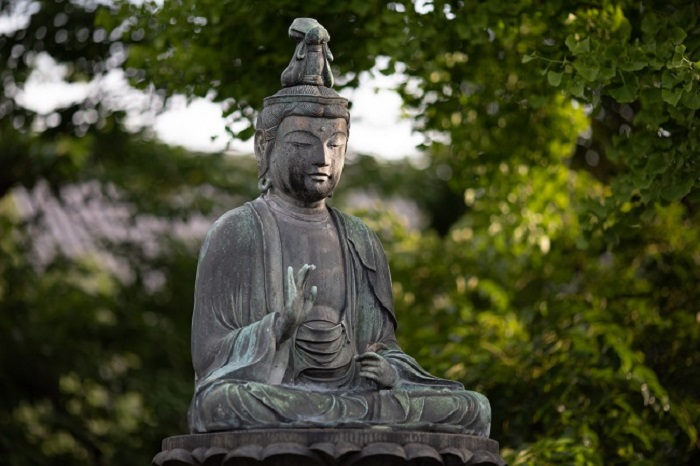Ahimsa: noun, ahim·sa ə-ˈhim-ˌsä: the Hindu and Buddhist doctrine of refraining from harming any living being
Merriam-Webster Dictionary
The doctrine of ahimsa is uncomfortable for many people. That’s because the doctrine of ahimsa sets forth an incredibly high standard for our behavior. Under the doctrine of ahimsa, we are supposed to refrain from harming any living being, either physically or emotionally. That isn’t an easy thing to do on a daily basis.
Realize that most of us harm living beings at some point every single day. For example, if you have a ham sandwich today for lunch, you’ve physically harmed a living being for your meal. If you insult or speak harshly to someone today, you’ve emotionally harmed another living being.
But if you want to become a better human being, it’s worth your time to grapple with the doctrine of ahimsa and try to incorporate this doctrine into your daily life.
The most effective way to embrace ahimsa is to use this doctrine to guide every action you take during the day. That means asking yourself this question: Will my words or actions in this moment either physically or psychologically hurt another living being? If you conclude that you are going to hurt another living being, then you should think about whether that’s really what you want to do, or whether you might want to make another choice.
Below are some simple and practical ways to incorporate ahimsa into your daily life. Try these approaches and see how much more peaceful, kind and compassionate you can become!
Practice Kindness Towards Yourself and Others
The word ahimsa is a Sanskrit word meaning non-violence. It’s derived from the word “himsa” which means “violence” and “a” which means “not.” So, to practice ahimsa, we need to strive to be the opposite of violent. And the easiest way to do that it is to focus on being kind.
Kindness seems like a mushy, sweet concept. But being truly kind actually is hard to do! To be kind on a consistent basis takes mental fortitude. Kind people don’t just say and do whatever pops into their heads. They instead intentionally choose to be kind, no matter how they might be feeling in the moment. Most folks simply don’t have that level of self-control.
But if you want to practice ahimsa and commit to not harming others, that means being kind at all times. Even when you don’t feel like it. And even when you think, “I’m frustrated, and I’m going to tell that person off.” Kind people aren’t controlled by their emotions in that way.
I’ll admit that practicing ahimsa is hard. And at times, I fall short. For instance, on occasion, I express my irritation with other people, when I should be patient. I forget to ask myself, “Will my words hurt that person? Should I choose different ones?”
So, every day is an Ahimsa Challenge for me! Because I truly want to not just embrace ahimsa, but I want to embody it. My goal is to go through my day not harming any living being, and that means constantly working on being as kind as possible.
Avoid Harming Other Living Beings
Most people lose their enthusiasm for ahimsa when it comes to not physically harming other living beings. That is because if you are going to commit to not harm other living beings, that means not killing them for your dinner. It also means buying items that aren’t made of animals and buying products that weren’t tested on animals.
Frankly, if you want to strictly practice ahimsa, you need to be a vegan. Because vegans don’t bother other creatures to either be their food or to produce their food. With respect to this issue, I’ve taken a compromise position and have become a pescatarian. So, I choose to harm fish for my dinner, when I’m not eating vegetarian and vegan dishes. And I make sure to buy products that are designated to be “cruelty free” (meaning that they weren’t tested on animals).
I’ll concede that there is a spectrum of choices that we can make when trying to practice ahimsa with regard to our food, clothing and personal care products. However, the most important thing that we can do is to not stick our heads in the sand. So, if you want to incorporate ahimsa into your life, don’t just go to the grocery store and blindly buy a packet of chicken legs. Acknowledge the process that led to the chicken legs being in that packet and decide if you’re comfortable being part of that process.
The key to practicing ahimsa is to be conscious of your actions. We tend to go blithely through life, turning a blind eye to our impact on other beings. Ahimsa demands that we wake up and make intentional choices about how we affect the other living beings on this earth.
Practice Nonviolence in Your Communication
One of the simplest ways that we can practice ahimsa on a daily basis is to take care in how we speak to others. Realize that being careful with our words requires self-control. To be consistently non-violent with your words, you need to be able to control yourself, even if you are upset or frustrated.
Being non-violent in your communication also requires emotional maturity. After all, it takes maturity to know that simply because you can use harsh words or make negative comments doesn’t mean that you should do so.
Unfortunately, in our society, we applaud people who communicate harmfully. For example, in our political discourse, elected officials rudely insult each other, and we still vote for them! We even have comedians who make a living largely by ridiculing other people.
So, if you are going to embrace ahimsa and follow a path of non-violent speech, you have to accept that people may view you negatively. There are those who view a lack of aggression as a sign of weakness. But realize that consistently speaking kindly to others shows that you have self-control and mental fortitude. It shows that you aren’t controlled by your emotions, but instead, you are in complete control of yourself and how you speak to others. And there’s nothing more admirable than that!
Develop Your Compassion for Others
In order to practice ahimsa and stop hurting others, we have to develop our compassion for others. That means that the suffering of other living beings actually has to matter to us. We need to be concerned when another living being is suffering.
If the suffering of others bothers us, then presumably, we’ll be less likely to hurt others. But if the suffering of others doesn’t concern us, then we are more likely to do and say whatever we feel like, without regard for the effect of our behavior on others.
For example, if I don’t have compassion for your psychological suffering, then I can be rude to you, speak harshly to you or insult you, and I can remain unperturbed. Your suffering will in no way inhibit me from saying anything that pops into my head. But if I have compassion for you and care about your suffering, then I naturally won’t want to be the cause of that suffering by being rude or unkind.
I know lots of people who are on varying ends of the compassion spectrum. For example, my daughter is someone who is incredibly compassionate. She cares about the suffering of animals, children and even strangers on the street. And she constantly is considering whether her words or actions could have a negative impact on others, whether it be other people or animals. To me, she is the embodiment of compassion (and ahimsa) because she is always thinking about how she may be affecting other living beings.
And sadly, I know people on the other end of the compassion spectrum. There are the folks who will just say and do whatever they feel like, without regard for the suffering that they cause others. And it’s because they don’t have compassion for others. The suffering of others is not on their radar because they solely are concerned with their own needs, wants and feelings.
So, if you want to embrace ahimsa, it’s critical to develop your compassion. Learn to be concerned about others. You might start by simply being concerned with your immediate family or co-workers. But you then can expand your concern for people who you don’t know or the animals that inhabit our planet. When you have sympathy for the suffering of others, it’s much easier to practice ahimsa because you won’t want to be the cause of anyone’s suffering!
Start a Meditation Practice
It’s much easier to not harm other living beings when we are calm. The reality is that we tend to be unkind or cruel toward others when we are mentally agitated. And the best way to calm your mind is to have a meditation practice.
Meditation is nothing more than taking time out of your day to experience having a calm mind. We do so by sitting still and focusing on something innocuous, like our breath, or a statue, or perhaps a view of nature. And we direct all our attention to that one thing.
By directing our attention to something simple, like our breath, we stop the whir of worries and frustrations that often are running through our brains. Instead, our minds become calm because we are focused on something pleasant in our immediate vicinity.
I often use this analogy when describing the benefits of meditation. A mind that regularly meditates is like a still pond. For the most part, it is very still, like glass. And once in a while, life may throw in a pebble. That pebble may be bad news, or it may be the irritating behavior of a co-worker of a family member.
The mind that regularly meditates will react to the bad news or irritating behavior like the still pond. There may be a momentary ripple. But then the mind will soon go back to being a still pond. In short, it will go back to being calm because that is its natural state.
Because meditation creates a calm mind, when we meditate regularly, we just don’t feel like harming other living beings. Instead, we simply want to interact peacefully with the world. In short, we want to practice ahimsa and be at peace with all living things.
If you are seeking to incorporate the doctrine of ahimsa into your daily life, I encourage you to follow the approaches above. If you do so, not only will you be a happier person, but you will make the world a far better place! (To read about making your words count, click here.)








